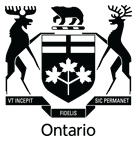
655 Bay Street, Suite 1500, Toronto, ON M5G 1E5
Tel: 416-212-6349 | 1-866-448-2248
Web Site: olt.gov.on.ca

|
Ontario Land Tribunal 655 Bay Street, Suite 1500, Toronto, ON M5G 1E5 Tel: 416-212-6349 | 1-866-448-2248 Web Site: olt.gov.on.ca |
French and English languages are official languages of Canada, and a fundamental characteristic of the Canadian identity. The importance of language rights is recognized in the Canadian Charter of Rights and Freedoms.
The French Language Services Act, R.S.O. 1990 (FLSA) provides that the Government of Ontario shall ensure that services in the Province are provided in French in accordance with the FLSA.
The Ontario Land Tribunal (OLT) is an adjudicative tribunal established by legislation. The OLT provides services for resolving disputes in the Province of Ontario.
The OLT strives to provide equal quality services in both official languages.
The purpose of this Policy is:
If there is any conflict between this Policy and the provisions of Rules of Practice and Procedure of the OLT, this Policy shall prevail.
Communications in General
The OLT shall communicate in the party’s language of choice (French or English) notwithstanding the fact that a
party’s representative may not speak the party’s language of choice. A party may change the language of his or
her
communication by notifying the OLT in writing prior to commencement of the proceedings.
Written Communications
All written materials generated by the OLT for the public, including the OLT’s website, social media content,
publications, forms, notices, rules, and policies,
shall be available in English and in French and be each other’s equivalent in quality and content.
All file-related correspondence initiated by the OLT, including any electronic versions of such materials, shall be provided in the client's language of choice (French or English). The OLT forms shall include a notice that they are also available in the other language.
Oral Communications
When clients contact or are contacted by the OLT by phone, the point of first contact shall greet the client in
both languages (French and English) and continue in the party's language of choice (French or English). If the
first point of contact is not able to communicate to the client in their language of choice,
they shall direct the party to an employee in a designated bilingual position and do so without unreasonable
delay.
Automated telephone services shall be available in French and English, including the interactive voice response system. Voicemail of all employees in designated bilingual positions shall provide information in both French and English.
OLT Proceedings
A French speaking or bilingual employee, adjudicator or the OLT’s service provider, as the case may be,
shall be assigned to proceedings in the following circumstances:
Clients requesting French language services shall have equal access to all applicable services available before the OLT and the quality of French language services shall be of equivalent to the quality of service provided in English.
Parties shall provide as much notice as possible, in advance of a proceeding, to advise the OLT that they are requesting French or bilingual services OR that they no longer require the requested French or bilingual services. Adjudicators or the OLT service providers, as the case may be, shall consider each late request that proceedings be conducted in French.
A French-English interpreter shall be provided by the OLT for a party or witness who does not understand the other language. The OLT shall ensure that bilingual and French language proceedings are scheduled within timeframes equivalent to those applicable to proceedings in English.
Decisions
OLT decisions shall be released in the language of the hearing, English or French. Decisions relating to
hearings where the clients have participated in both English and French shall be released concurrently in both
languages.
The OLT shall consider requests by a party for a translated copy of a decision to the other language and, absent
undue hardship, arrange for a translation.
Documents and Translations
Parties may submit written submissions or evidence either in English or in French and
the documents shall form part of the record in the language in which they are submitted.
As a general practice, the OLT shall not translate documents provided by a party, but may provide translations of any documents, or order a party to provide translation of documents at their own expense, if it considers it necessary for the fair and efficient determination of the matter.
The OLT shall review this Policy every two (2) years and update the Policy, if necessary, to ensure that it reflects the most recent and applicable legal developments.
Feedback and complaints relating to the quality of French language services or application of this Policy may be sent to OLT.Coordinator@ontario.ca. Complaints shall be processed pursuant to the OLT’s Public Complaints Policy.
Complaints may also be sent to Ontario's Office of the Ombudsman at its website: https://www.ombudsman.on.ca/have-a-complaint, by phone at 1-866-246-5262, or by email to sf-fls@ombudsman.on.ca.
The Ontario Ombudsman is an Officer of the Ontario Legislative Assembly who is independent of government and political parties. The Ombudsman's Office promotes fairness, accountability and transparency in the public sector by resolving and investigating public complaints and systemic issues within its jurisdiction. The Ombudsman's jurisdiction and powers of investigation also include ensuring that the rights of Ontarians and the obligations of government agencies are respected according to the FLSA. The Ombudsman has a French Language Services Commissioner at the Deputy Ombudsman level, and a dedicated unit within its office for this work.